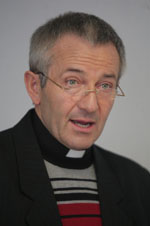Más del 80% de las defunciones en el mundo occidental se producen en hospitales, según un teólogo polaco
More than 80% of deaths in the Western world occur in hospitals, says Polish theologian
Jan Perzson advocated the creation of hospices, as they "focus on psychological and spiritual needs," not just medical care.

Jan Perzson, Dean of the School of Theology Nicolaus Copernicus (Poland) gave a seminar for professors at the School of Theology of the University of Navarra, in which he compared what 'dying well' means for the tradition and for the hospitaller culture. To this end, he presented a field study he conducted on the Kashubians -an ethnic group of Poland- between 1991 and 2000 and in 2008, 2009, 2010. As he explained, this group is very characteristic for its beliefs and customs around death and funerals.
The Polish theologian began by explaining what a good death consists of in the tradition. Thus, he indicated that for centuries the bed itself has been considered the place of natural death and it was believed appropriate to be prepared for that moment. He also pointed out the two levels on which the good death took place: the community and the spiritual dimension, which favored the company of family and neighbors in the last moments of the sick person and the celebration of religious rites.
According to Jan Perzson, this traditional model has been disappearing over the last 50 years, due to factors such as advances in medicine that have increased life expectancy average . In this regard, he commented that more than 80% of deaths in the West occur in hospitals. He also stressed that in recent times the conviction has arisen that it is not appropriate to talk or think about death, which has led to it being considered a taboo.
The medical team, 'protagonist' of the death
On the other hand, he pointed out that the medicalization of death has caused the subject to cease to be the protagonist of his death: he is deprived of the company of his loved ones and attention is focused on the medical team and their efforts to save a life. "This creates certain anthropological outcomes where the only essential dimension of human nature is the body and its functions, which are subject to technical procedures," he said.
"This new model in which death takes place in the hospital," he added, "has almost automatically eliminated the richness of the previous Christian model , created over the centuries. Human death is thus deprived of the Christological perspective, which transforms the drama into an act of offering oneself to God."
Thus, he proposed the creation of hospices for the terminally ill, which in his opinion "offer a more holistic approach to this subject of patients and their spiritual and corporal nature. The effort is directed towards palliative care, but also concentrates on the psychological and spiritual needs of the sick. The aim is to provide them with a comfortable stay in a family environment, which fosters the conditions for cultivating a religious dimension of suffering and death".
